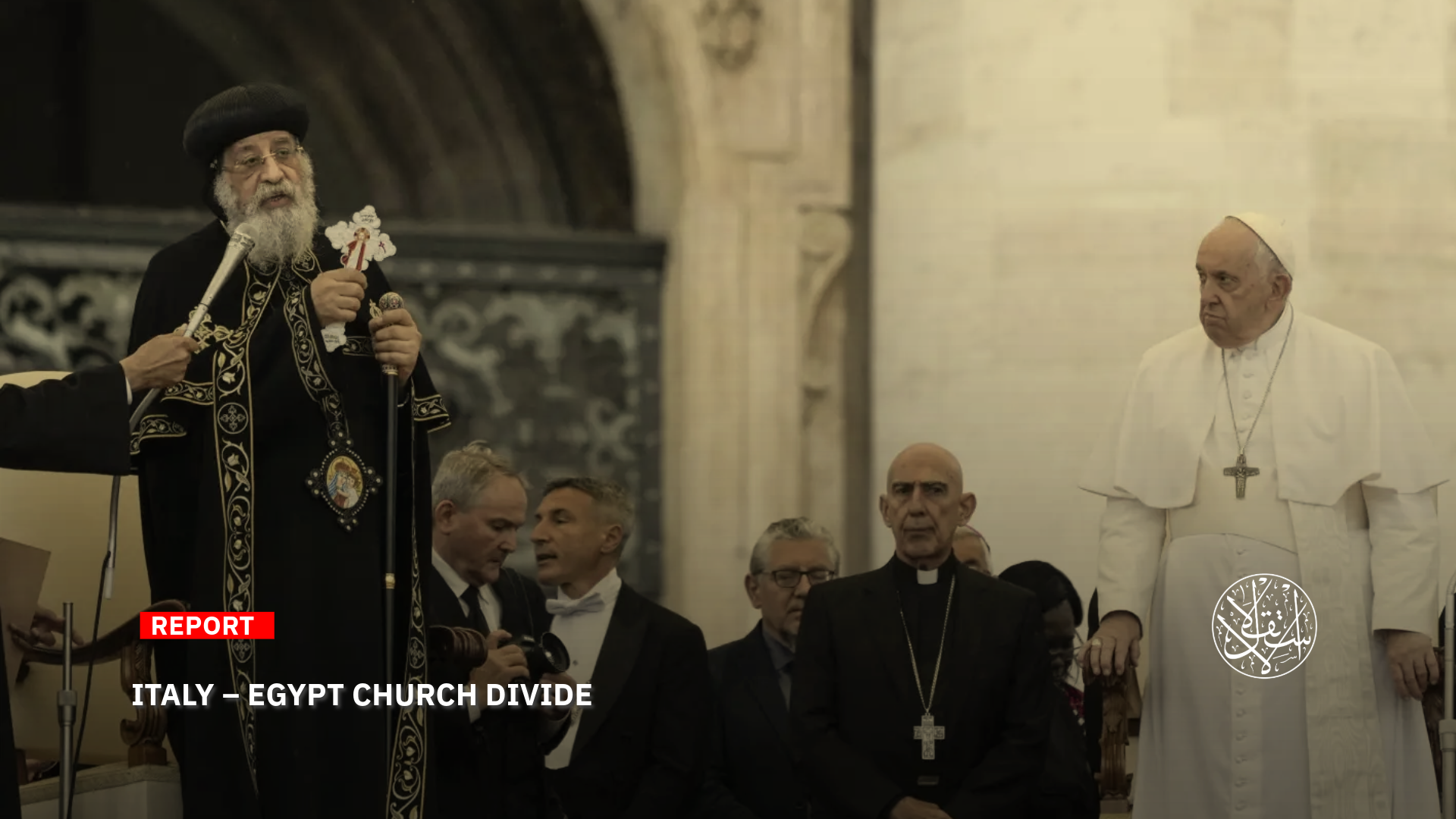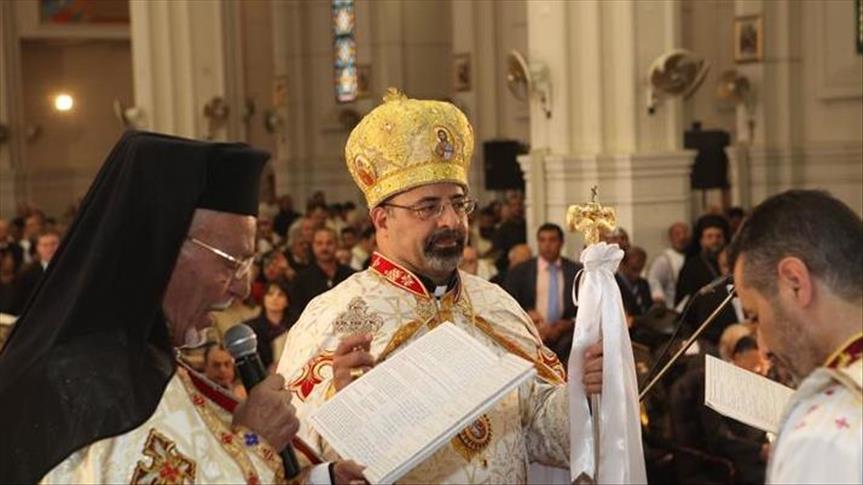Vatican and Egypt’s Catholic Churches at Odds Over Gay Priests and LGBTQ+ Inclusion

The Italian Church believes that 'sexual orientation should not deprive a person of serving the Lord.'
The Catholic Church in Italy sparked a new controversy when it released a document on January 10, 2025, addressing the sexual identity of priests.
The "Italian Bishops' Conference" (CIE) issued what it called "Updated Guidelines," which implicitly accepted the possibility of openly gay individuals serving as bishops.
In response, the Catholic Church in Egypt, led by Patriarch Ibrahim Isaac, issued a statement on January 16, 2025, denying any allowance for gay individuals to become priests.
This signals a growing rift between the Catholic Church in Rome (the Vatican) and its counterpart in Egypt, compounded by some Western resistance to the idea of gay clergy.
However, a review of earlier statements from the Vatican—particularly one issued on April 8, 2024, which officially approved same-sex relationships and marriages—coupled with protests from Arab churches, highlights that this religious and ecclesiastical divide is far from new.
The Dispute
The Catholic Church in Egypt denied reports suggesting that gay individuals could be ordained as priests, stating that "there is no truth to the rumors or misinterpretations regarding the possibility of ordaining homosexuals."
While reaffirming its respect for all individuals, the Church made it clear that it would not accept "those who practice homosexuality, have homosexual tendencies, or support its culture" in theological or priestly seminaries.
The Catholic Church in Egypt sought to clarify Article "44" concerning individuals with same-sex tendencies applying to religious institutions, by offering its interpretation of some points from the newly released guidelines.
"The educational authority and the Church, while deeply respecting the individuals concerned, cannot permit the admission of those who practice homosexuality or those with deeply rooted homosexual tendencies into theological schools and sacred orders," the article stated.
In contrast, the full text of the "Italian Bishops’ Conference" guidelines, issued on January 10, appeared to suggest a less rigid approach towards allowing gay men to become priests within the Catholic Church.
Titled "Guidelines and Standards for Seminarians," the document did not explicitly endorse the admission of gay men into the religious institution, a point that the Egyptian Church highlighted.

However, these "Updated Guidelines" suggest that "sexual orientation should not deprive a person of serving the Lord."
This points to a more open approach in the future, potentially allowing the idea of gay Catholic priests—an issue that was not addressed by the Egyptian Church in its statement.
The new guidelines, which were quietly published on the Italian Bishops’ Conference website, state that religious seminary directors "should consider the sexual preferences of candidates for the priesthood, but only as one aspect of their personality."
"When referring to homosexual tendencies during the formation process, it is also appropriate not to reduce the discrimination to this aspect alone, but to understand its meaning within the full context of the young person's character," the guidelines add.
The Italian bishops confirmed their approval of the document in November 2024, and included a note from the Vatican's Clergy Office affirming that the guidelines would be in effect for a three-year trial period.
This is where the rift between the Church in Rome and its counterpart in Egypt emerged. The latter attempted to deny that the "Updated Guidelines" allowed for the possibility of gay priests, offering an interpretation of the Italian text of the document.
Reports have tried to downplay the significance of this detail, arguing that this aspect (regarding a priest’s homosexuality) does not alter the fundamental duties of a priest.
Even if a priest were gay, they would still be "forbidden from engaging in sexual activity" according to Catholic doctrine, which prohibits priestly marriage.
The Vatican Approved!
To confirm the decision of the Italian Bishops' Conference, the Vatican in Rome has endorsed the Italian guidelines "allowing gay men to become priests," as reported by Reuters on January 10, 2025.
The Vatican approved the new guidelines set by the Italian bishops, which permit gay men to enter religious seminaries, but with the stipulation that they "abstain from engaging in sexual activity."
This represents an unexpected shift in how the global Catholic Church might handle potential priests in the future.
This time, the Vatican did not explicitly ban gay men from entering the priesthood, whereas its previous directive in 2016 had stated that “theological seminaries cannot admit men with deeply rooted homosexual tendencies.”

The New York Times reported on January 10, 2025, that the “Vatican allows Italian gay men to train to be priests, if they remain celibate."
The report confirmed that the "guidelines" adopted by the Italian Bishops' Conference in November 2024 and approved by the Vatican's Clergy Office came into effect on January 9, 2025, for a three-year trial period.
The guidelines state that "candidates for religious seminary should not be excluded based on sexual orientation," marking a significant shift in the Church's approach to sexuality in the formation of clergy in Italy.
This was echoed by The Guardian on January 10, 2025, which noted that "Gay men can train as priests but must be celibate."
"Gay men who are sexually active cannot be admitted to seminaries or any other holy orders."
"Gay men will be allowed to train as priests in Roman Catholic seminaries, so long as they observe celibacy, according to new guidelines announced by the Italian Bishops Conference (CIE)," The Guardian reported.
Italian Denial
However, the Catholic News Agency reported on January 14, 2025, that an Italian bishop denied any change in the policy regarding the ordination of gay individuals.
The report pointed to unusual interpretations, summarizing that a gay priest could only be accepted if he leads a "chaste" life, meaning he renounces his homosexuality.
This, however, is something that cannot be controlled or verified, as it pertains to a private life, and scandals have often emerged even among those who do not embrace a homosexual lifestyle.
Pope Francis has "repeatedly expressed concern" that gay candidates for the priesthood could end up engaging in relationships and living what he described as a "double life," according to The Guardian.
In 2024, Pope Francis stated that there was "a great deal of homosexuality" in Italian theological seminaries.
The Catholic News Agency also reported that Bishop Stefano Manetti of Italy wrote in Avvenire, the publication of the Italian Bishops' Conference, that "this is not the correct reading" of the text "Formation of Priests in Italian Churches: Guidelines and Rules for Religious Institutes."
Manetti explained that Paragraph 44, which allegedly allows the acceptance of gay priests, is a repetition of Paragraph 199 from a 2016 document issued by the Italian Synod titled "The Gift of the Priestly Vocation: The Essential Ratio of the Priestly Institution," as well as a document published by the Congregation for Catholic Education in 2005.
Both documents state that "individuals with 'deep-seated' homosexual tendencies cannot be admitted to religious institutes," according to Manetti.
Additionally, Father James Martin wrote on X that his personal interpretation of the matter is that a gay man should be able to live a "healthy chaste and celibate life," meaning he would renounce homosexuality during the stages of his selection as a priest.
As reported by the Pillar on January 13, 2025, the Italian Bishops' Conference stated that "gay seminarian policy’ reports are fake news."
The conference emphasized that the recently published guidelines "norms do not change the Church's policy on homosexuality and seminary formation."
"large secular media outlets began to report that the text was a change to the Church’s existing policy on the formation of seminarians who identify as gay."
"The Italian text repeated guidance from two Vatican dicasteries which explains that formators cannot admit to the seminary or to holy orders those who practice homosexuality, present deep-seated homosexual tendencies or support the so-called ‘gay culture,’" the Pillar reported.
It also pointed out that the media focused on a specific paragraph from the Italian document, which urges that the focus should not be solely on the candidate’s homosexual orientation when considering their suitability for priestly formation.
The Church Embraces LGBTQ+ Community
On April 8, 2024, the leadership of the global Catholic Church (the Vatican) published a new document titled Dignitas Infinita ("Infinite Dignity"), which it said was intended to honor "human dignity" and officially recognized same-sex relationships and marriages.
The document condemned "all offenses against life itself, such as murder, genocide, abortion, euthanasia, and willful suicide must be recognized as contrary to human dignity.”
However, it also defended the rights of LGBTQ+ individuals in all forms, including the right to same-sex marriage within Catholic churches, reaffirming the Church's "“to reaffirm that every person, regardless of sexual orientation, ought to be respected in his or her dignity and treated with consideration, while ‘every sign of unjust discrimination’ is to be carefully avoided, particularly any form of aggression and violence.”
“In some places, not a few people are imprisoned, tortured, and even deprived of the good of life solely because of their sexual orientation,” Dignitas Infinita noted.
The 23-page document, which was approved by Pope Francis, was described by Agence France-Presse at the time as "a way of addressing internal divisions within the Church after four months of controversy sparked by the blessing of same-sex couples, particularly within the conservative camp."
Pope Francis, the leader of the Catholic Church since 2013, has long been associated with a more welcoming approach toward the LGBTQ+ community, allowing priests to bless same-sex couples on a case-by-case basis.

However, the acceptance of gay men into the priesthood has remained a somewhat taboo topic. Many gay priests often express fear about discussing their sexual orientation.
In January 2023, Pope Francis stated in an interview with The Associated Press that "being gay is not a crime."
Later that year, he agreed to "bless" same-sex couples but continued to assert that marriage could only be between a man and a woman.
Although he is considered one of the most supportive popes in terms of "LGBTQ+ rights," the pontiff's language when discussing the community has often been criticized as condescending by some.
On December 18, 2023, Pope Francis officially approved allowing priests to bless same-sex couples—something he had previously rejected, insisting that "God cannot bless sin."
In collaboration with Cardinal Víctor Manuel Fernández—his new right-hand man and fellow Argentine who now heads the Congregation for the Doctrine of the Faith—Francis approved a series of measures, including blessing same-sex marriages and allowing transgender individuals to be baptized and serve within the Church.
These decisions sparked a strong conservative backlash, with harsh criticisms directed at Francis.
Several senior clergy members, particularly in Africa, Eastern Europe, and Asia, have rejected the Vatican's guidelines on blessing same-sex couples.
The document issued on April 8, 2024, does not revoke or radically change Francis' stance on LGBTQ+ issues, but it does reject gender-affirming surgeries, according to The Washington Post on April 8, 2024.











